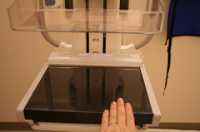Adverse Outcomes More Likely in Infants Born to Mothers Who Get the Flu
Life in the Womb Can Program Future Heart Disease
Transparency and Technology Reduced Racial Disparities in Early Lung Cancer Treatment
Prescription Opioids Lead to Decrease in Labor Participation and Increase in Unemployment
 Philippe Henrot, MD
Radiology Department
Institut de Cancerologie de Lorraine
Vandoeuvre-les-Nancy
MedicalResearch.com: What is the background for this study? What are the main findings?
Response: The initial observation was that daily practice of mammography shows a substantial proportion of women that report a negative experience after having a mammogram. Compression of the breast before delivering X-rays is mandatory to achieve the best image quality and to detect small cancers. Unfortunately, compression is uncomfortable, even sometimes painful.
We took into consideration a study of PJ Kornguth et al. published in 1993 reporting the self-compression technique. In this study one breast was compressed by the radiographer and the other with self-compression. The author reported a high level of patient satisfaction, and a lower discomfort, without compromising image quality. We performed a multicenter prospective randomized trial to demonstrate the feasibility of the self-compression technique in condition similar to routine screening or follow-up, compared with standard compression. The primary outcome was to demonstrate that self-compression did not lead to compress the breast less than standard compression, and that was done. The secondary outcomes were to evaluate pain, compression force and image quality.
The results indicated that compression force was higher when the women controlled themselves the compression of their breast, and the pain measured on a visual analogue scale was lower. Moreover, image quality was not compromised compared with standard compression. (more…)
Philippe Henrot, MD
Radiology Department
Institut de Cancerologie de Lorraine
Vandoeuvre-les-Nancy
MedicalResearch.com: What is the background for this study? What are the main findings?
Response: The initial observation was that daily practice of mammography shows a substantial proportion of women that report a negative experience after having a mammogram. Compression of the breast before delivering X-rays is mandatory to achieve the best image quality and to detect small cancers. Unfortunately, compression is uncomfortable, even sometimes painful.
We took into consideration a study of PJ Kornguth et al. published in 1993 reporting the self-compression technique. In this study one breast was compressed by the radiographer and the other with self-compression. The author reported a high level of patient satisfaction, and a lower discomfort, without compromising image quality. We performed a multicenter prospective randomized trial to demonstrate the feasibility of the self-compression technique in condition similar to routine screening or follow-up, compared with standard compression. The primary outcome was to demonstrate that self-compression did not lead to compress the breast less than standard compression, and that was done. The secondary outcomes were to evaluate pain, compression force and image quality.
The results indicated that compression force was higher when the women controlled themselves the compression of their breast, and the pain measured on a visual analogue scale was lower. Moreover, image quality was not compromised compared with standard compression. (more…)Skin Care Products Make Cotton Fabrics More Flammable
Study Find No Difference in Standardized Test Scores in Children With/Without Diabetes
Federal Incentives Did Not Reduce Catheter Infections in Hospitals
Safety of MRIs in Patients with Tattoos
MedicalResearch.com Interview with:
Dr. Martina Callaghan PhD Head of Physics & Senior Lecturer Wellcome Centre for Human Neuroimaging Institute of Neurology University College London London
MedicalResearch.com: What is the background for this study? What are the main findings?
Response: As mirrors the situation in the general population, we found that an increasing number of volunteers who were seeking to enter cognitive neuroscience studies at our Centre had tattoos. However, the magnetic fields used in magnetic resonance imaging (MRI) pose a potential safety risk for people with tattoos. A number of case reports have described such incidents. However, as these describe isolated cases retrospectively, there was not enough information to objectively assess the risk of tattoo-related adverse reactions for persons having an MRI scan. Therefore, in 2011, we decided to embark upon this first prospective study to quantitatively assess this risk.
(more…)How Functional Are Frail Adults After Aortic Valve Replacement?
USPSTF Recommends Antibiotic Prophylaxis to Prevent Gonorrheal Eye Disease in Newborns
Study Evaluates Thyroid Hormone Suppression For High Risk Thyroid Cancer
Dive Deep Into Migraine’s Link to Increased Stroke Incidence
Exercise Prevents Falls
 Cathie Sherrington FAHMS
Professor, NHMRC Senior Research Fellow
Institute for Musculoskeletal Health
The University of Sydney
MedicalResearch.com: What is the background for this study? What types of exercise were tested or indicated?
Response: Falls are a very common problem with at least one in three people aged 60+ falling each year. This review included all types of exercises delivered to people aged 60+ in the general community i.e., not those living in supported accommodation and not among people with particular health conditions such as a stroke or Parkinson’s disease.
(more…)
Cathie Sherrington FAHMS
Professor, NHMRC Senior Research Fellow
Institute for Musculoskeletal Health
The University of Sydney
MedicalResearch.com: What is the background for this study? What types of exercise were tested or indicated?
Response: Falls are a very common problem with at least one in three people aged 60+ falling each year. This review included all types of exercises delivered to people aged 60+ in the general community i.e., not those living in supported accommodation and not among people with particular health conditions such as a stroke or Parkinson’s disease.
(more…)Waist to Height Ratio Linked to Cardiovascular Disease Risk in Men
Should Hospitalized Asthma Patients Receive Antibiotics?
Younger Generations at Much Higher Risk of Obesity Related Cancers
Absolute Risk Low, but Increased Maternal Morbidity Linked to IVF
Emergency C-Section Raises Depression Risk For New Moms
Screen Time Effects on Child Development
- Our study revealed that on average children were viewing screens for 2.4, 3.6 and 1.6 hours per day at two, three and five years of age, respectively. This means that the majority of the participants in our sample are exceeding the American Academy of Pediatrics’ guideline.
- We found statistically significant, albeit small effects suggesting that greater amounts of screen time at two and three years predict poorer child outcomes at three and five years, respectively. Thus, screen time has a lasting influence on children’s development.
- The opposite pattern was not observed. That is, we did not find evidence that children showing poor performance in terms of achieving developmental milestones were more likely to be place in front of screens to help cope with their potentially challenging behaviors.
Policies Reducing Prescription Opioids Have Limited Effect on Overdose Deaths
 Dr. Qiushi Chen (first author) and
Jagpreet Chhatwal PhD
Assistant Professor, Harvard Medical School
Senior Scientist, Institute for Technology Assessment
Massachusetts General Hospital
MedicalResearch.com: What is the background for this study? What are the main findings?
Response: Opioid overdose epidemic is a national public health emergency — in 2017, more than 49,000 people died from overdose. Our study shows that under current conditions, the number of deaths is projected to increase to 81,700 by 2025. Efforts to curb the epidemic by reducing the incidence of prescription opioid misuse — the primary focus of current interventions — will have a modest effect of 3-5% reduction in overdose deaths.
(more…)
Dr. Qiushi Chen (first author) and
Jagpreet Chhatwal PhD
Assistant Professor, Harvard Medical School
Senior Scientist, Institute for Technology Assessment
Massachusetts General Hospital
MedicalResearch.com: What is the background for this study? What are the main findings?
Response: Opioid overdose epidemic is a national public health emergency — in 2017, more than 49,000 people died from overdose. Our study shows that under current conditions, the number of deaths is projected to increase to 81,700 by 2025. Efforts to curb the epidemic by reducing the incidence of prescription opioid misuse — the primary focus of current interventions — will have a modest effect of 3-5% reduction in overdose deaths.
(more…)Knee Implants: Electrical Energy Harvested From Walking Can Power Sensors
Prions from Brain Detectable in Skin Earlier Than Brain Damage
Validation of MEESSI Score for Acute Heart Failure Risk
The MEESSI Score seems to be a highly promising tool for stratifying patients presenting to the emergency department with acute heart...

























